Community News
Expats history in Tianjin: Tientsin's Race Course
(Jin Magazine)
Updated: 2012-05-04
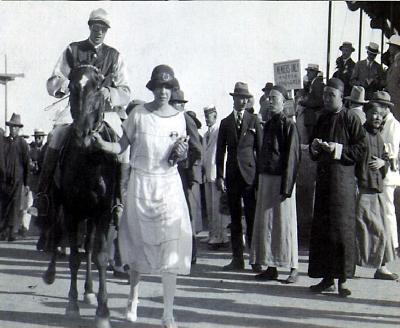 |
|
Major Kirkpatrick and his wife Gisela Detring at Tientsin Racecourse.c.1920s |
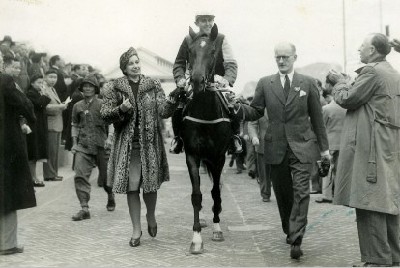 |
| Mr Oberg leads a winner ridden by Mike Boycott c.1930s |
The horses ridden in the mid-nineteenth century were China ponies more commonly called 'griffins' and coming from Mongolia. Apparently, "the first month …was one long tussle, marked by many bruises and some bites" while "controlling their speed was far from easy" (Wood p.26). Tientsin had its own horse bazaar managed in the 1880s by a Mr Moore who went to Mongolia himself to select horses and started a subscription system whereby prospective buyers subscribed in equal shares with horses numbered and drawn by lot. Owners subsequently found taller and faster cross-bred ponies produced by Russians near Harbin from about 1915. Dickinson in Tientsin introduced some twenty of them but sparked a crisis in the racing world of China. Numerous attempts were made to determine true Mongol ponies and whether cross-breeding had been deliberate or accidental. It was eventually left to individual race clubs to decide which horses they would allow to race.
In the 1930s, there seem to have been an increase in the number of military riders. A soldier serving in the Queen's Royal Surreys stationed in Tientsin observed: "The sport of kings was part of the life of the average Chinese citizen. They loved to gamble. It was not long before Regimental Race Meetings were organized and some of the members of the Battalion were on horse back while stationed in China. Lieutenant Monty Sydenham-Clarke* won a race in Tientsin and was presented with an inscribed watch. In 1941, in the Western Desert, he was reported missing. He was not heard of again until some weeks later when his body was found and identified by the watch presented to him by the Tientsin Race Club all those years ago!" (http://www.queensroyalsurreys.org.uk/hongkong_china/hkc08_1.shtml)
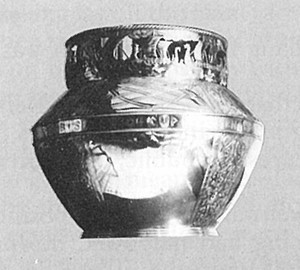 |
| The Schleswig Cup, 1920 (Coates p.154) |
There were a variety of prizes. There was the aforementioned Taotai Cup and the Maiden Plate of the late 1800s. In the early 1900s, the Trial Plate and in 1920, the largest and heaviest cup ever presented in the China races was the Schleswig Cup given by the Danish community of Tientsin as a token of thanks for Britain's support in restoring Schleswig-Holstein to Denmark. Fortuitously, the winner of the race was a British owner with a Danish jockey!
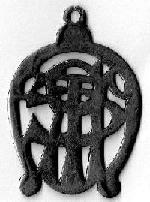 |
|
Members badge for the Tientsin Race Club, to be shown at the exclusive entrance gate. |
All this activity was presided over by the influential Tientsin Race Club, a changing group of men who held respected positions within the Concessions.
The Racecourse was still in evidence under the Japanese occupation as shown by the photo below, but the sport was no doubt considered bourgeoisie and gambling associated with it outlawed when the Communist Party came to power in 1949. The Country Club became the Cadres' Club and today is a shadow of its former self though much building activity has taken place on the site of the racecourse which is ringed by high quality hotels, as yet another kind of race takes place in Tianjin.
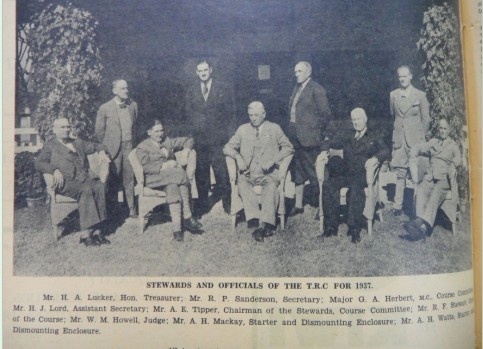 |
|
Stewards and officials of the Tientsin Race Club, Peking and Tientsin SundayTimes,November 28, 1937 p.6 |
*Note: Tao`tai"\, n. [Chin. tao circuit + t'ai, a title of respect.] In China, an official at the head of the civil and military affairs of a circuit, which consisted of two or more fu, or territorial departments.
References:
Coates, Austin (1994) China Races. Hong Kong: Oxford University Press.
Wood, Frances (2000) No Dogs and Not Many Chinese. Treaty Port Life in China 1843-1943. London: John Murray.
Modern China Through the Eyes of Tianjin: 100 Firsts. (2007) Tianjin People’s Press.
http://www.goeaston.net/-thumeco/RTismar.html
http://www.grehoundderby.com/Tientsin
http://www.queensroyalsurreys.org.uk/hongkong_china/hkc08_1.shtml
